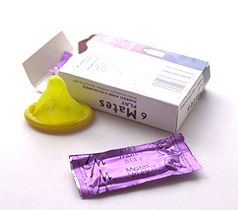




Although condoms have been in use since ancient times,
Casanova was the first to popularize their use. They
were at first made of linen or animal intestines, but
at the advent of vulcanized rubber in the 1840's they
took on the name "rubbers" and were mass produced.
There are many types of condoms available; most are made
of latex rubber, but some are made from polyurethane or
even animal tissue (e.g., "natural skin"). They may be
lubricated, ribbed, or treated with spermicide, and may
be purchased without a prescription. Condoms are
convenient and easy to use. They can help both partners
from giving each other
sexually transmitted diseases (STDs).
Male Condoms
The condom is a thin shield that is worn on the penis.
It traps the semen expelled from the penis during intercourse,
preventing sperm from entering the vagina. A man must put on
a condom while he has an erection but before intercourse.
Afterward, he should withdraw immediately to prevent leakage.
Although condoms can be effective, they sometimes
break during intercourse. For this reason it is suggested
that they be stored in a cool, dry place; oil-based lubricants
(such as Vaseline or baby oil) should not be used as they can
weaken latex condoms. Even medication for female yeast
infection can cause condom failure.
Condoms, especially the spermicidal variety, increase the risk
of urinary tract infections in women. In fact spermicidal
condoms have not been shown to be more effective than condoms
without spermicide. Some men and women find the latex
irritating due to allergy, and spermicidal condoms can worsen
the allergenic properties of the latex. For sensitive
individuals, non-spermicidal polyurethane or natural skin
condoms may be more acceptable. Natural skin condoms, however,
are expensive and do not protect against disease, and
polyurethane condoms are more likely to break. Most men
report reduced sensitivity during intercourse, some men find they
cannot retain an erection when a condom is used, and condoms
may affect the spontaneity of intercourse. When used
consistently by married couples, condoms can be very effective,
but failure rates are much higher for unmarried couples and
teenagers.
If a condom is to be effective, the most
important rule is to use it every single time. A new one must
be worn if intercourse is repeated.
More about safer sex.
Average Failure Rate: 14%

![]() : United States Condom Distributer
: United States Condom Distributer

Go to next section
Visitors Since 9-5-00
Updated: Oct. 8, 2002

